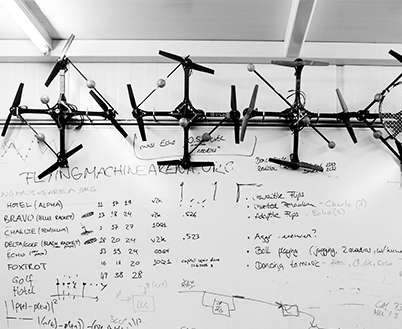| Software Stops Quadcopters Falling |
| Written by Alex Armstrong | |||
| Sunday, 15 December 2013 | |||
|
The rise of the quadcopter drone seems unstopable even if no one has found a sensible practical use for them - but what about safety. Does the future hold the prospect of drones falling from the sky onto the heads of unsuspecting people? With four propellers you might think that a quadcopter could with stand the loss of maybe one or two without dive bombing to the ground. The big problem is that the multiple propellers perform a very delicate balancing act. If just one propeller fails then the result is a crazy spiral crash dive to the ground. Now consider some of the more recent and slightly fanciful suggestions for the use of drones such as Jeff Bezos' Amazon Air Prime. Apart from being great publicity for Amazon the idea has also caused people to consider the idea of having drones deliver things and with much amusement and worry about having Amazon merchandise falling on heads. If drones are ever going to deliver anything they first have to be safe to fly over head - but there are lots of other problems.
It turns out that you can get a very big improvement in quadcopter safety with just a little software. Mark Mueller at ETH Zurich has worked out a controller for a quadcopter that loses one or more propellers. The idea is that you put the drone into a spin about its vertical axis which causes it to vibrate but remain otherwise controllable. If you take a look at the video you should get the idea fairly quickly. "The failsafe controller uses only hardware that is readily available on a standard quadrocopter, and could thus be implemented as an algorithmic-only upgrade to existing systems. Until now, the only way a multicopter could survive the loss of a propeller (or motor), is by having redundancy (e.g. hexacopters, octocopters). However, this redundancy comes at the cost of additional structural weight, reducing the vehicle's useful payload. Using this technology, (more efficient) quadrocopters can be used in safety critical applications, because they still have the ability to gracefully recover from a motor/propeller failure"
It looks as if it might work the bad news is: "This technology is patent pending." I'm not sure what is so novel about the approach that it deserves a patent but make sure you check it out before trying to re-invent the same technique using off the shelf control theory.
More Informationhttp://www.flyingmachinearena.org Related ArticlesFlying Neural Net Avoids Obstacles
To be informed about new articles on I Programmer, sign up for our weekly newsletter, subscribe to the RSS feed and follow us on Twitter, Facebook or Linkedin.
Comments
or email your comment to: comments@i-programmer.info
|
|||
| Last Updated ( Sunday, 22 October 2023 ) |


